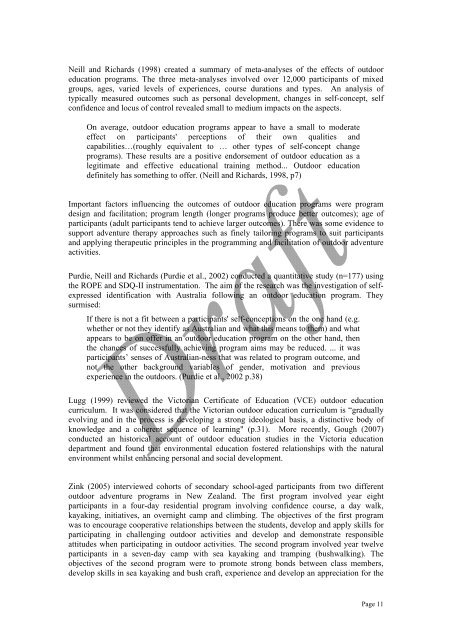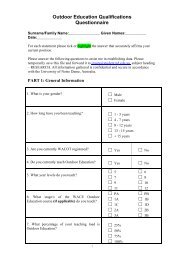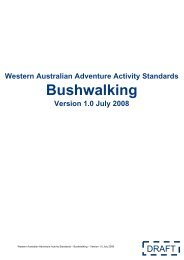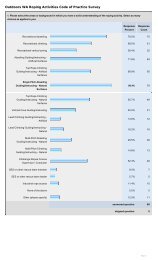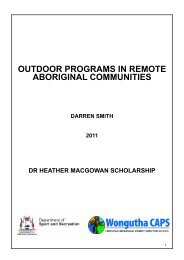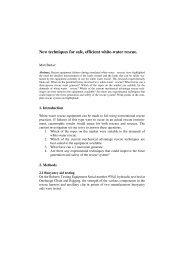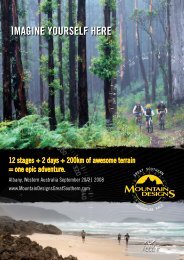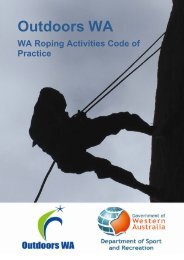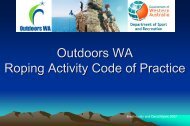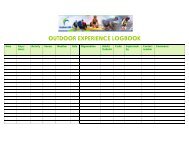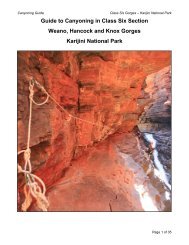Outdoor Adventure Activities Benefits Catalogue - Outdoors WA
Outdoor Adventure Activities Benefits Catalogue - Outdoors WA
Outdoor Adventure Activities Benefits Catalogue - Outdoors WA
You also want an ePaper? Increase the reach of your titles
YUMPU automatically turns print PDFs into web optimized ePapers that Google loves.
Neill and Richards (1998) created a summary of meta-analyses of the effects of outdooreducation programs. The three meta-analyses involved over 12,000 participants of mixedgroups, ages, varied levels of experiences, course durations and types. An analysis oftypically measured outcomes such as personal development, changes in self-concept, selfconfidence and locus of control revealed small to medium impacts on the aspects.On average, outdoor education programs appear to have a small to moderateeffect on participants' perceptions of their own qualities andcapabilities…(roughly equivalent to … other types of self-concept changeprograms). These results are a positive endorsement of outdoor education as alegitimate and effective educational training method... <strong>Outdoor</strong> educationdefinitely has something to offer. (Neill and Richards, 1998, p7)Important factors influencing the outcomes of outdoor education programs were programdesign and facilitation; program length (longer programs produce better outcomes); age ofparticipants (adult participants tend to achieve larger outcomes). There was some evidence tosupport adventure therapy approaches such as finely tailoring programs to suit participantsand applying therapeutic principles in the programming and facilitation of outdoor adventureactivities.Purdie, Neill and Richards (Purdie et al., 2002) conducted a quantitative study (n=177) usingthe ROPE and SDQ-II instrumentation. The aim of the research was the investigation of selfexpressedidentification with Australia following an outdoor education program. Theysurmised:If there is not a fit between a participants' self-conceptions on the one hand (e.g.whether or not they identify as Australian and what this means to them) and whatappears to be on offer in an outdoor education program on the other hand, thenthe chances of successfully achieving program aims may be reduced. ... it wasparticipants’ senses of Australian-ness that was related to program outcome, andnot the other background variables of gender, motivation and previousexperience in the outdoors. (Purdie et al., 2002 p.38)Lugg (1999) reviewed the Victorian Certificate of Education (VCE) outdoor educationcurriculum. It was considered that the Victorian outdoor education curriculum is “graduallyevolving and in the process is developing a strong ideological basis, a distinctive body ofknowledge and a coherent sequence of learning" (p.31). More recently, Gough (2007)conducted an historical account of outdoor education studies in the Victoria educationdepartment and found that environmental education fostered relationships with the naturalenvironment whilst enhancing personal and social development.Zink (2005) interviewed cohorts of secondary school-aged participants from two differentoutdoor adventure programs in New Zealand. The first program involved year eightparticipants in a four-day residential program involving confidence course, a day walk,kayaking, initiatives, an overnight camp and climbing. The objectives of the first programwas to encourage cooperative relationships between the students, develop and apply skills forparticipating in challenging outdoor activities and develop and demonstrate responsibleattitudes when participating in outdoor activities. The second program involved year twelveparticipants in a seven-day camp with sea kayaking and tramping (bushwalking). Theobjectives of the second program were to promote strong bonds between class members,develop skills in sea kayaking and bush craft, experience and develop an appreciation for thePage 11


